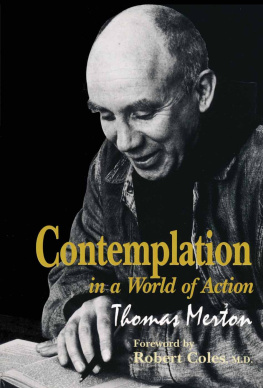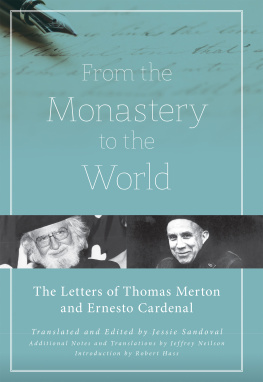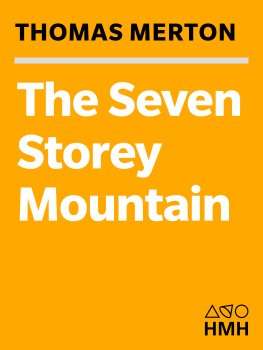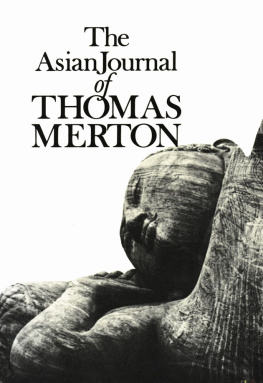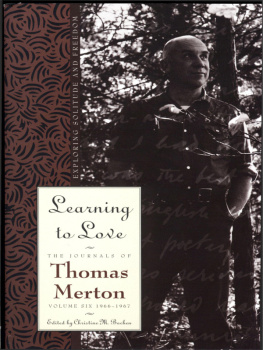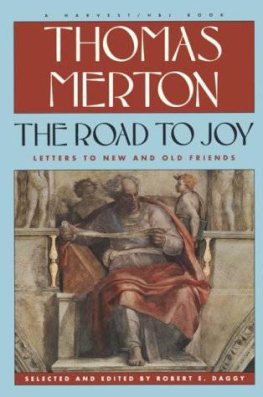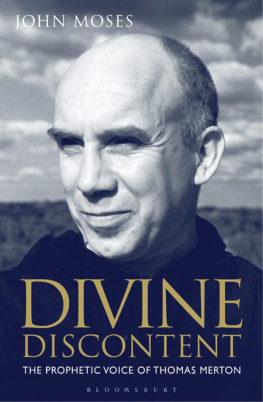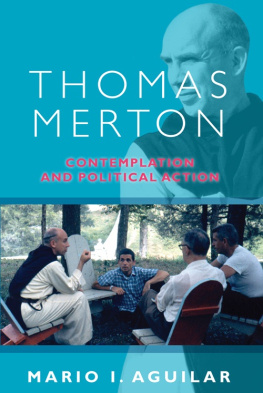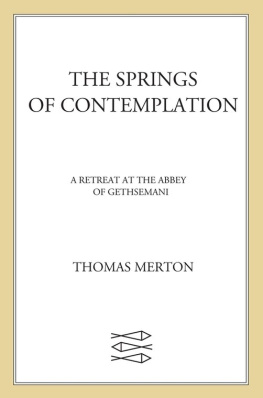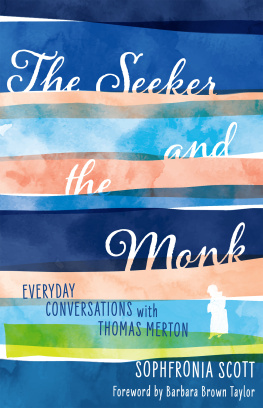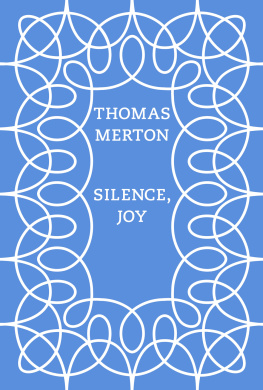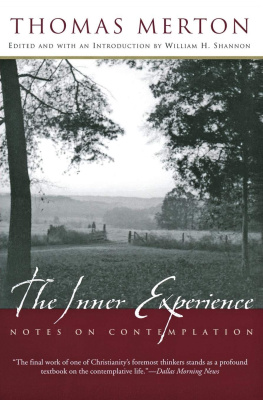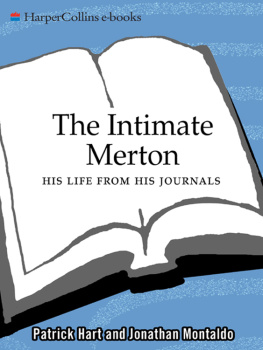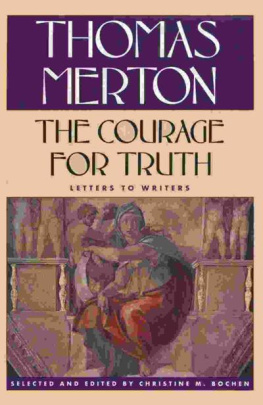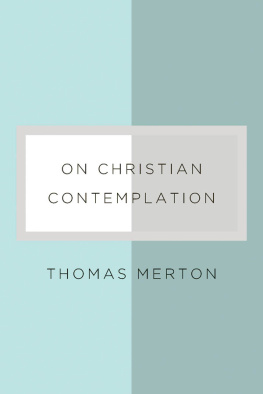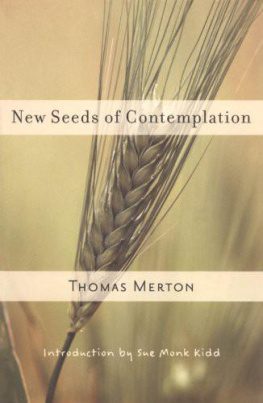Thomas Merton - Contemplation in a World of Action
Here you can read online Thomas Merton - Contemplation in a World of Action full text of the book (entire story) in english for free. Download pdf and epub, get meaning, cover and reviews about this ebook. year: 2017, publisher: University of Notre Dame Press, genre: Religion. Description of the work, (preface) as well as reviews are available. Best literature library LitArk.com created for fans of good reading and offers a wide selection of genres:
Romance novel
Science fiction
Adventure
Detective
Science
History
Home and family
Prose
Art
Politics
Computer
Non-fiction
Religion
Business
Children
Humor
Choose a favorite category and find really read worthwhile books. Enjoy immersion in the world of imagination, feel the emotions of the characters or learn something new for yourself, make an fascinating discovery.
- Book:Contemplation in a World of Action
- Author:
- Publisher:University of Notre Dame Press
- Genre:
- Year:2017
- Rating:4 / 5
- Favourites:Add to favourites
- Your mark:
- 80
- 1
- 2
- 3
- 4
- 5
Contemplation in a World of Action: summary, description and annotation
We offer to read an annotation, description, summary or preface (depends on what the author of the book "Contemplation in a World of Action" wrote himself). If you haven't found the necessary information about the book — write in the comments, we will try to find it.
Contemplation in a World of Action — read online for free the complete book (whole text) full work
Below is the text of the book, divided by pages. System saving the place of the last page read, allows you to conveniently read the book "Contemplation in a World of Action" online for free, without having to search again every time where you left off. Put a bookmark, and you can go to the page where you finished reading at any time.
Font size:
Interval:
Bookmark:

Contemplation in a World of Action
Gethsemani Studies
in Psychological and
Religious Anthropology
Ernest Daniel Carrere, O.C.S.O.
Series Editor
Funded by a generous grant from
Richard C. Colton, Jr.
Thomas Merton
Contemplation in a World of Action
Foreword by Robert Coles, M.D.
University of Notre Dame Press
NOTRE DAME, INDIANA
University of Notre Dame Press
Notre Dame, IN 46556
undpress.nd.edu
All Rights Reserved
Copyright 1998 by University of Notre Dame
Published in the United States of America
Designed by Wendy McMillen
Set in 10.5/14 Galliard by The Book Page, Inc.
Cover photograph by John Howard Griffin 1995 by Elizabeth Griffin-Bonazzi
Reprinted in 2001, 2003
Library of Congress Cataloging-in-Publication Data
Merton, Thomas, 19151968.
Contemplation in a world of action / Thomas Merton.
p. cm. (Gethsemani studies in psychological and religious anthropology)
ISBN 0-268-00834-5 (pbk. : alk. paper) ISBN 978-0-268-16236-8 (hardback)
1. Monastic and religious life. 2. Spiritual lifeCatholic Church. I. Title. II. Series.
BX2435.M46 1999
248.8'94dc21
98-46482
ISBN 9780268162375
This book is printed on acid-free paper.
This e-Book was converted from the original source file by a third-party vendor. Readers who notice any formatting, textual, or readability issues are encouraged to contact the publisher at .
Contents
by Robert Coles, M.D.
The pages that follow give us a great gift: Thomas Merton, the well-known storyteller who wrote with an engaging, sometimes captivating lyrical intensity, as well as essayist who dared contemplate in the middle years of this past century an America gone awry, both at home and in its actions abroad, now addresses us in quite another way.
This very Thomas Merton, so known to many of us for his lifes moral and spiritual drama, for his courageous, compelling, often special and idiosyncratic voice (his manner of being!) turns his attention (and with it, ours) to the world he called his own for so long, that of the monastery and, beside it, the secular world we take for granted in our daily lives. Ironically, Merton does so with fear of irony. He who took sharp and pointed aim at many secularists and the occasional emptiness and sadness of their lives now reaches out with a telling gratitude and humility to those whose thoughts and theories, whose ways of seeing and understanding, have something (so he feels) to offer the monastic milieu. A whole tradition of psychological introspection and social observation is daringly embraced, welcomed, given close scrutiny for all it can mean to monks who are, after all, fellow human beings of us who live in colleges and universities, in hospitals, law firms, and places of business.
In a sense, it is no surprise that Merton here so vigorously and knowingly turns to Freud and his intellectual descendants. Again and again the word identity or the phrase identity crisis gets summoned, although nowhere mentioned is the name of child psychoanalyst Erik H. Erikson, who first used this language. His immensely important writing and research constantly emphasize the struggle so many of us wage, in adolescence and beyond, as we try to find a personal destiny for ourselves and try also to make commitments to others. We give ourselves over to others, both individuals and institutions and, more broadly, to places where we work and to neighborhoods in which we live, while reserving for ourselves a certain distance: the right, it can be said, to be appreciative and responsive and loyal, with the obligation to find a proper respect for our own personal or private ideas and ideals.
Indeed, as I read through Mertons comments on the monastic life as it has developed and changed over the centuries (and not least here in America), I kept remembering Erik H. Eriksons words as I read them in his various writings and as I was privileged to hear them as a member of a seminar he taught and, eventually, as someone who interviewed him many times, often with the help of a tape recorderin the end, writing his biography.
No wonder, then, I remembered a particular conversation with Erikson when I read a chapter titled The Identity Crisis in Mertons book. In fact, throughout the book, in chapter after chapter, the child psychiatrist and psychoanalyst in me was stirred, as was the student of Erikson and of his teacher Anna Freud (she almost single-handedly got her father to pay close heed to young people and their tensions as they tried to find a life for themselves).
Erikson never allowed himself to forget his own situation. He could be a bemused, even worried observer of Americas youth, its young men and women at times lost in their fads, crushes, kicks, but not rarely lost in themselves, in preoccupations, worries, fears that were all too unnerving. Nevertheless, like Merton, he could readily turn his gaze inward and thereby take stock of the profession that meant a lot to him, the people he knew as colleagues, the places they assembled. Thus, in his Harvard Library study during the summer of 1967 amidst the struggles of the civil rights era, many of them instigated and kept going by young people in the midst of adolescence, this response after I had given him some descriptions of my work in the South with those youths: As I listen to you I realize how much they have to say to people like you and me: we have some rules and regulations, some outmoded customs and ideas and principles to examine and outgrow, both! I look at our [psychoanalytic] institutions, and I see plenty of the conformity and smugness some of our rebellious adolescents denounce. Its so easy for us to use our psychological language to put down othersand all the while we fail to notice our own shortcomings, and worse! Thats the big question, once you start being really honest with yourself (never mind honest about what you see in others!)how do you keep your eyes and ears open, and hold on to what youve been given in your profession? I mean, how do you accept what you really do valueand take that acceptance seriously enough so that you see where mistakes have been made, wrong directions pursued?
He had himself stressed fidelity as a proper and salutary outcome of the identity crisisthe way one caught up in such confusion, turmoil, uncertainty, and perplexity can at the same time explore new ideas and new ways of seeing, being, and learn as well what really matters in this or that world, what is worth respecting on the one hand or setting aside, leaving behind on the other. Erik walks a tightrope often with ease and grace, Anna Freud told me in London as she, very much like him, was distinguishing between what of a particular tradition she held close to her heart but also found worthy of criticism, in need of vigorous disagreement, refutation. In her amplifying words: Sometimes we become all too sure of ourselves, all too willing to denounce others, renounce what they saida measure of our passion to control things and, I regret to say, hear only the echoes of our own voices!
I know Thomas Merton would have shared with Miss Freud and with Erik Erikson, were they somehow brought together, the experiences he shares here with us. He would have heard from them, in return, their assents, seen from them nods, widened eyes of interest and of awakened memory and reflection.
Here is a book that very much belongs to any of us who want to consider young people as they seek their vocations, and to older people who need to stop and think not only what they believe and want to see happening in others, but what has happened in themselves, to them and their co-workers, trusted colleagues.
Next pageFont size:
Interval:
Bookmark:
Similar books «Contemplation in a World of Action»
Look at similar books to Contemplation in a World of Action. We have selected literature similar in name and meaning in the hope of providing readers with more options to find new, interesting, not yet read works.
Discussion, reviews of the book Contemplation in a World of Action and just readers' own opinions. Leave your comments, write what you think about the work, its meaning or the main characters. Specify what exactly you liked and what you didn't like, and why you think so.

